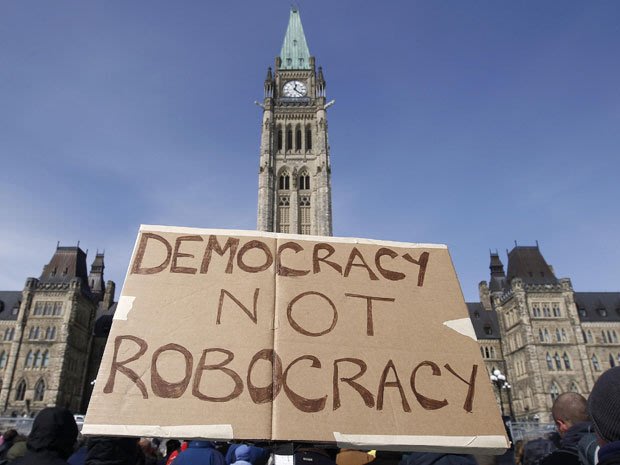When news broke of a targeted robocall campaign that was intent on misleading selected Canadians into polling locations, the irregularities started popping up all across Canada. With many pieces of the puzzle linking to the ruling Conservative party, Canadians became evermore cynical of the way politics is conducted and began their calls for a public inquiry.
Arguably, the 'tough on crime' Conservatives should have pursued the suspicion of crime, voter suppression to be exact, but instead they started to point fingers and downplayed the misleading robocalls which served to be a major offense against Canadian democracy.
The recent robocalls in Saskatchewan uncover some interesting observations:
- While the Conservatives initially denied involvement, they admitted to it a few days later. Here is what DeLorey had to say:
Last Friday:
"We are not polling."
Tuesday:
"In regards to the calls last week that went into Saskatchewan concerning redistribution, the calls came from the Conservative Party.
There was an internal miscommunication on the matter, and the calls should have been identified as coming from the Conservative Party.
As I said in the past, we are not polling on this issue, we already know where people stand - 75% of people who attended the public hearings and submitted written submissions opposed these drastic changes to the boundaries.
But we are doing a host of things to communicate with voters and get their feedback.
Not only were these changes opposed by 75% of the public, but an actual member of the commission also opposed these changes, which led to an unprecedented Dissenting Report by the boundary commission." - The calls were meant to criticize the new electoral map that was drawn by a non-partisan institution. Note that with Canada's first-past-the-post system, the size of the riding can and will change the outcome of who wins the seat and down the line, who forms the government.
This sparked debate in the House of Commons between NDP leader Thomas Mulcair and Conservative Prime Minister Stephen Harper.Thomas Mulcair: "The independence of the Canadian electoral boundary commission is fundamental to our democracy. Conservatives paid for fraudulent robocalls using a fake company name to misinform voters and manipulate an important part of our democratic system.
Worst yet, Conservative party officials lied to Canadians to try to avoid taking responsibility for their actions. Who will the prinme minister hold accountable for this fraud?"
Stephen Harper: "Clearly I rejected the accusations of that particular question. I think the party has explained this particular matter. As I think the Speaker knows very well, there are electoral commissions in effect to redraw boundaries. Those commissions accept and expect input from Parliamentarians, from political parties and from the general public. There has been, in Saskatchewan, overwhelming opposition to the particular proposals but we are simply operating within the process as it exists and indeed it encourages all actors to do."
Thomas Mulcair: "How do robocalls become input in our democratic process?"
The similarities between the robocall and Meier's voice prompted Postmedia News and the Ottawa Citizen to ask US-based audio expert Ed Primeau to analyze and compare the samples. Primeau has testified as an expert in dozens of American courts and abroad, is a board member of the American Board of Recorded Evidence, and furthermore a member of the American College for Forensic Examiners International.
Primeau's comparison led to his conclusion that he is 95% certain that Meier's voice is the voice that was recorded in the robocalls that struck Saskatchewan residents last week.
“He has a distinct style of speaking,” he said. “Everybody has a distinct style. It’s like a fingerprint.”
One phrase, however, stood out as being identical: “and reason for call.”
A frequency analysis confirms the match, he said. “They’re almost identical in the spectrum,” he said. “I’m looking at these and it’s insane how close they are.”
Meier was then contacted and asked if his companies were involved in the Saskatchewan robocalls.
“Thanks for thinking of me, but your fascination is unwarranted.”
Putting the pieces together, it seems the Conservatives, once reluctant to acknowledge the robocall scandal, are now being linked to it from all corners. Why would the party deny involvement and then admit to it with an excuse? What do you think of the latest news? Follow us and let us know what you think: Facebook, Twitter, Google+.















No comments:
Post a Comment